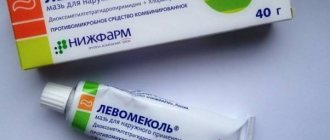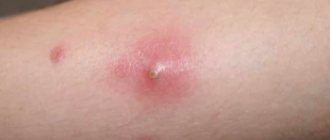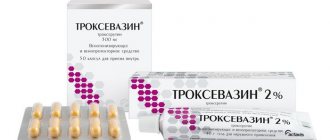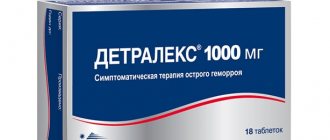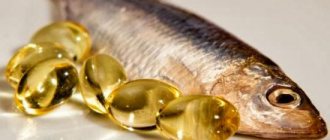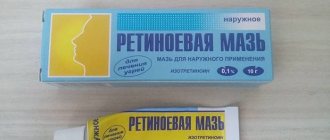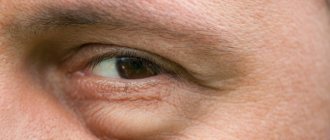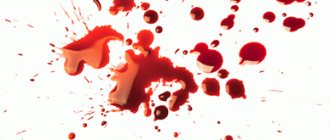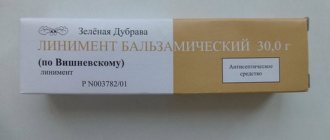Ichthyol ointment is used for hemorrhoids as an antiseptic and disinfectant.
In the photo: ichthyol ointment 10%
The effect of its use:
- Relieving inflammation.
- Elimination of infections from the skin.
- Promotes restoration of damaged tissues.
- Relieves itching and burning.
- It has a slight analgesic effect several hours after application.
Available in pharmacies without a prescription. Storage duration is up to 3 years.
Composition of the drug
Ichthyol ointment, which is popularly called ichthyol, is a one-component drug, since it contains only one active ingredient - ichthammol.
The auxiliary composition of the ointment, which is also represented by one ingredient - petroleum jelly, maintains the shape of the drug, softens the skin and facilitates the absorption of ichthammol into the tissue.
The medication is available in plastic and glass jars of 25 grams, as well as aluminum tubes of 30 grams.
Healing properties of ichthyol
The pharmacological properties of the drug are determined by the action of ichthammol, so let’s look at what this component is, how it is obtained and how it works for hemorrhoids.
Ichthammol (ichthyol) is an oily substance of organic origin with a specific sulfur odor, which is obtained by dry distillation of shale rocks. When translated from Greek, ichthammol means fish, since fish remains are preserved in these shale deposits.
Ichthyol contains a lot of useful minerals and other active substances, among which sulfur and thiophene are of greatest value for hemorrhoids.
Thanks to sulfur and thiophene, ichthyol has the following medicinal properties:
- antimicrobial;
- anti-inflammatory;
- decongestant;
- antipruritic;
- healing.
The mechanism of action is that ichthyol activates blood circulation in the vessels of the anorectal region, improves microcirculation in the affected tissues and reduces the permeability of endothelial pores. Due to this, the outflow of blood from the vessels of the rectum is normalized, the tone of the vascular walls is restored, the healing of cracks is accelerated, and inflammation and its symptoms are stopped.
Reviews
Rimma: “Ichthyol ointment helps against hemorrhoids better than other remedies - after 3 applications, all symptoms of the disease disappear. It eliminates inflammation and itching especially well.”
Yulia: “When I was pregnant and faced with the problem of hemorrhoids, I asked my gynecologist whether this ointment could be used to treat swollen nodes? They allowed me, it seems to be harmless. It helps quickly, in just a week the bumps disappeared.”
Anton: “Ointment with ichthyol treats hemorrhoids only if the nodes are located outside. If you have an internal form of the disease, it is better to replace it with ichthyol suppositories. Otherwise there is no point."
Polina: “An acquaintance advised me to smear hemorrhoids with ichthyol - he works as a urologist in a well-known Moscow clinic. He says this is a universal thing, it treats any inflammation, the main thing is to use it correctly.”
Indications for the use of ichthyol ointment for hemorrhoids
The use of ichthyol ointment for hemorrhoids is possible in the following cases:
- internal and external hemorrhoids;
- anal tears;
- eczema and dermatitis in the anus;
- proctitis
You need to understand that treatment with ichthyol ointment in patients with hemorrhoids will give positive dynamics only in the initial stages of the disease. In addition, therapy should not be limited only to the use of this medication, since hemorrhoids can only be cured with the help of complex treatment.
Indications and contraindications
Contraindications to the use of this drug include the patient's intolerance to the components included in the drug and a tendency to develop allergies. Also, the ointment should not be used by children under 12 years of age and those who take medications containing alkaloids, iodine, or heavy metals. In other cases, the use of the medicine is permitted. Medicinal ointment is used to treat skin ailments such as:
The drug is effective for joint pain.
- haemorrhoids;
- burns;
- furunculosis;
- eczema;
- neuralgia;
- joint pain;
- erysipelas;
- rosacea;
- prostatitis;
- hidradenitis;
- streptoderma;
- gynecological diseases;
- postoperative sutures.
Ichthyol ointment: how to use for hemorrhoids?
Despite the safety of ichthyol ointment, treatment with this medication should be carried out as prescribed by a proctologist. Only a specialist can determine the advisability of ichthyol therapy, select the most effective regimen of use and exclude the presence of contraindications.
It is also important to properly prepare the anus area for applying ichthyol ointment. To do this, you need to empty your intestines, wash with warm water without detergents or a weak solution of potassium permanganate, then dry your skin with a soft, lint-free towel and wash your hands with soap.
The method of using ichthyol depends on the type of hemorrhoids.
External use
For external hemorrhoids and anal tears, ichthyol ointment is spread in a thin layer on external hemorrhoids and the skin around the anal ring twice a day - morning and evening. The course of treatment is from 1 to 2 weeks, depending on the severity of the symptoms of the disease.
Rectal application
When the cones are located rectally, the ichthyol is introduced into the rectal canal using a finger or a cotton pad, which is impregnated with the drug.
For internal hemorrhoids and proctitis, the drug is used twice a day for 7-14 days. The frequency of use and duration of treatment is determined by the attending doctor.
After using the drug, it is recommended to lie down for 30-40 minutes so that it is better absorbed into the tissue, and also wash your hands with soap to avoid getting the ointment on the mucous membranes of the eyes or mouth.
Instructions for use
Ichthyol ointment is often used to treat hemorrhoids, despite the wide range of rectal suppositories available in pharmacies. Many of them contain glucocorticosteroids and bismuth compounds, which have a toxic effect on tissue. Ichthammol is a natural product, safe even for children and pregnant women.
The drug is accessible, inexpensive, and its effectiveness has been confirmed by clinical trials.
The product is well tolerated and does not have a wide list of contraindications. It is combined with most pharmacological agents, therefore it is used in the complex treatment of hemorrhoids. The drug cannot be used only with alcohol solutions containing iodine. The trace element enters into a chemical reaction with the sulfur contained in ichthammol, causing irritation of the epithelium.
Indications and contraindications
The use of Ichthyol ointment for hemorrhoids to treat cracks is based on its ability to improve blood circulation. The external agent disinfects infectious foci and stops the inflammatory process. Healing of the anal fissure begins after a single application of the drug.
In dermatological practice, it is used in the treatment of infectious skin diseases:
- dermatitis, including allergic and neurogenic;
- eczema and ulcers, the treatment of which is complicated due to putrefactive processes;
- acne and pimples accompanied by bacterial infection.
Ichthyol ointment is a time-tested remedy for the treatment of purulent boils. It draws out the infiltrate from inflammatory foci, stimulating tissue healing.
In gynecology, tampons with a mixture of ichthammol and glycerin are used in the treatment of pathologies of the reproductive system. These include colpitis, andexitis, vaginitis and vulvovaginitis.
The only contraindication to treatment with Ichthyol ointment is intolerance to the constituent components.
Directions for use and doses
The drug is used in the treatment of hemorrhoids, regardless of the stage of its progression and the degree of tissue damage.
Proctologists prescribe it to patients for recovery after surgery, during which hemorrhoids are removed. Daily and single dosages, as well as the duration of treatment, are determined by the doctor. It necessarily takes into account the dynamics of tissue regeneration, individual for each patient. How to use
Ichthyol ointment for the treatment of internal or external hemorrhoids:
- apply a thin layer of the product on a sterile napkin and apply to the inflamed hemorrhoids;
- soak a cotton-gauze swab with ointment and carefully insert it into the rectum.
The average duration of the therapeutic course is 10-14 days. Before the procedure, you must wash the anorectal area with soap and water. It is advisable to empty your bowels first. Proctologists recommend using drugs with a mild laxative effect for this purpose. These include syrups with lactulose - Duphalac, Normaze, Lactussan.
We recommend
Detailed review (pros and cons, instructions, reviews) Ichthyol ointment.
Use during pregnancy
During the period of bearing a baby, most women suffer from painful manifestations of hemorrhoids. The cause of the pathology is changes in hormonal levels and a constantly increasing size of the uterus. It compresses internal organs, including the large intestine. As a result of poor circulation, the nodes become inflamed and pain occurs with every act of defecation.
During pregnancy, proctologists recommend using 10% Ichthyol ointment for hemorrhoids. It does not have a negative impact on the growth and intrauterine development of the child. You should abandon tampons and simply apply the product to the hemorrhoids. This procedure will help avoid possible irritation of the rectal mucosa.
Side effects and special instructions
Adverse reactions often develop when medicinal tampons are inserted into the rectum. They manifest themselves in the form of burning, itching, and pain. When applying the product to hemorrhoids, small rashes rarely form. But to the question whether it is possible to smear Ichthyol ointment on cones with hemorrhoids, proctologists give a positive answer.
Thanks to its natural composition, this drug is considered one of the safest medications.
Possible undesirable effects when treated with ichthyol ointment
Ichthyol ointment is a reliable and safe drug, but in rare cases, patients may develop an allergic reaction to the components of the ointment. Most often, allergies manifest themselves in the form of local changes, including hyperemia, swelling, itching and burning of the anus, urticarial rashes and dermatitis.
If such signs of allergy to the drug appear, it is necessary to stop treatment, wash off the remaining ointment and take an antiallergic medicine, for example, Suprastin.
To determine the presence of an allergy to ichthyol, you can perform a simple test. To do this, apply a little ichthyol ointment to the skin of the inner surface of the forearm and evaluate the result after 20 minutes. If redness, itching, swelling or hives appear in the area where the ointment was applied, these symptoms are signs of an allergy to this drug.
Properties of the ointment and pharmacological action
The main active component of the drug is ichthyol (90%), the additional component is petroleum jelly (10%). Ichthyol has a strong antiseptic effect. Thanks to this, the ointment disinfects the affected area of the anal canal and subsequently prevents the development of an infectious process. The pronounced antiseptic and anti-inflammatory effect of the ointment can significantly alleviate the patient’s condition.
The pharmacological drug promotes:
- Reducing the intensity of pain. The anesthetic effect occurs within 1-1.5 hours from the moment of application of the medicine.
- Restoring blood circulation in hemorrhoids. Also improves the elasticity and tone of blood vessels.
- Reduction of swelling in the anal area.
- Eliminate itching, discomfort, burning sensation.
- Healing of ulcers, anal fissures.
You may also be interested in: Bezornil ointment instructions for use
The drug is suitable for use during an exacerbation of the disease, as it has an analgesic, regenerating, disinfecting, and anti-inflammatory effect on hemorrhoidal cones.
Ichthyol is a product of dry distillation of bituminous shale, which contains the remains of fish and marine animals
Using ichthyol ointment for hemorrhoids during pregnancy
Unfortunately, pregnant women are at high risk for developing hemorrhoids. This is explained by the fact that during pregnancy, the level of progesterone in the blood increases, which reduces vascular tone, and constipation often occurs due to compression of the rectum by the pregnant uterus.
In addition, many women overeat during pregnancy, consume large amounts of spicy and salty foods, and also abuse sweets, which negatively affects the condition of the vessels of the anus.
When treating hemorrhoids during pregnancy, a number of difficulties arise due to the fact that most highly effective drugs can affect the development of the fetus. But ichthyol ointment during pregnancy does not penetrate the placenta and cannot harm the unborn child. Therefore, this drug is widely used to treat hemorrhoids in pregnant women.
Also, ichthyol ointment does not pass into breast milk, which allows it to be prescribed to women even during breastfeeding.
Composition and mechanism of action
This drug owes its beneficial properties and therapeutic effects to only three main ingredients.
These are ichthammol, petrolatum and Vaseline. The active component is ichthammol, obtained by dry distillation of bitumen shale and consists of sulfur and thiophene. The components are easily soluble and therefore have high penetrating ability. Medical Vaseline helps moisturize and enhance skin regeneration processes, and a special additive, petrolatum, prevents effusions, nourishes and moisturizes the skin. Ichthyol ointment for hemorrhoids will provide the following effect:
- Eliminates pain and discomfort.
- Helps reduce swelling.
- Stimulates blood circulation in the affected area.
- Suppresses the activity of pathogenic microorganisms.
- Relieves anal itching.
- Strengthens venous walls.
- Relieves inflammation.
Ichthyol ointment and suppositories are used in the treatment of various types of this disease. The cost of such funds is very affordable, so even a long course of treatment will not become financially prohibitive.
Participate in an anonymous survey:
Have you consulted a doctor in person about hemorrhoids?
